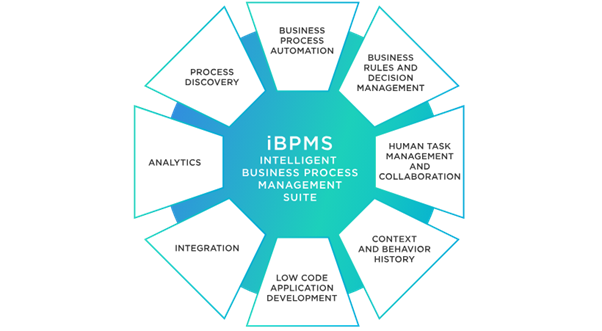Do you feel like your business practices have been outdated, and you are finding yourself lost in completing and filing the endless paperwork? It is time to transform your operations with Intelligent Business Process Management Suite (iBPMS).
Digital transformation of a business is about managing and completing tasks differently and effectively. It should address the evolving needs of the customer while optimizing the operation processes. The present-day digital transformation program struggles as it only addresses the problem but lacks flexibility for evolution. However, it will not be the same with iBPMS.
iBPMS stands for an integrated set of technologies that coordinates people, machines, and things, supporting the unique requirements for business process management. These technologies combine business process management with advanced capabilities like AI to create dynamic workflow experiences through a cloud-based platform and low-code tools.
Are you looking to optimize your business process and improve your efficiency with iBPMS? Let us explore the tool in more detail and determine whether it is suitable for your business.
What is iBPMS?

You must have understood that iBPMS meaning is Intelligent Business Process Management Suite. This software is the evolution of their predecessor, BPMS (business process management systems).
The Intelligent Business Process Management Suites (iBPMS) concept was initially introduced by Gartner back in 2012, driving organizations to declare that iBPMS would be the next dominant element in the corporate BPM domain.
In layman’s terms, BPM is used in operational management to model, analyze, improve, measure, discover, and automate business processes using different methods. However, iBPMS expands the capabilities of an excellent BPM tool and promotes artificial intelligence features, including event processing and cloud computing, real-time decision-making, and system crosslinking.
The end goal of iBPMS is to make business process management more intelligent, connected, and powerful. It generally includes modeling, execution, repository, rules management, content repository, collaboration, integration, optimization, monitoring, and administration.
How is iBPMS Utilized in Business?
The global demand of the iBPMS market is valued at USD 12 billion in 2023 and is expected to grow upto 20 billion by 2031, with a 50% CAGR. The reason behind such an increase in demand is that it provides many advantages, like:
- superior integration with other applications or tools,
- advanced analytics,
- user-friendly, low-code tools for citizen developers,
- complex event processing, optimization, monitoring, and management,
- cloud-based tools,
- ability to integrate with IoT,
- ease of use, and
- continuous process improvement.
Usually, a BPM system includes four crucial components:
- Process Builder: A process builder designs and manages a series of tasks that make up a process.
- Process Engine: The process manages the coordination and execution of tasks.
- Tools: It comprises various tools to manage the manual or automatically fed data to execute the process.
- Reporting Engine: It monitors and audits the activities and performance of tasks executed.
However, the iBPMS brings an intelligent angle to traditional BPM systems. The iBPMS system requires input along with its collected data to optimize your process. The AI component analyzes your current business process and determines which can be automated.
The analytics component monitors workflow KPIs in real-time through a central portal to identify opportunities for improvement. iBPMS utilizes ML, cloud computing, data mining, business rules, and even omnichannel communication features.
Let’s understand the use cases of the iBPMS system:
- Identify opportunities for process optimization
- Provide a service extension for mobile end users
- Include more analytics functions
- Process real-life events
Why Do Organizations Need iBPMS?
As the world moves faster than we think, organizations are leaping ahead with intelligent business process management (BPM) systems (iBPMS suites). These suites help organizations meet evolving needs and ensure that they stand at the forefront of operational excellence with their intelligent features.
1. Intelligence for Industry-Specific Processes
iBPMS facilitates intelligent automation for industry-specific processes, providing customized solutions across diverse industries. It ensures that your BPM solutions are suited to the specific needs of industries, optimizing processes with advanced features. The platform also supports use cases in social media, logicist, integration generative AI, and RPA for intelligence business process management.
2. Enable the Utilization of Advanced Technologies
iBPMS is well-known for its seamless integration with artificial intelligence, machine learning, IoT, and cloud computing for process automation. It also optimizes your business processes through big data analytics for intelligent decision-making.
The iBPMS allows dynamic process management in a rapidly evolving technology atmosphere, supporting process automation while aligning the process with emerging technologies. It enables businesses to leverage their benefits, resulting in better and more effective business processes.
3. Business Rules and Decision Management
Business rules play a vital role in process automation. They specify the objectives of the organization and provide guidelines on how processes will be performed. Organizations use the iBPMS to define, deploy, implement, monitor, and optimize business rules and logic. In this way, you can automate your decision-making process.
4. User-friendly Low-Code Tools
Low-code platforms empower citizen developers or business users with zero or minimal knowledge of programming to design and develop applications. As a result, you don’t have to rely on the IT team to create simple applications. This way, the burden will be reduced for the IT team while they focus on core and more value-added activities.
5. Simple Interface and Features
Enhancing stakeholder experience is key to iBPMS software. Its user-friendly interface paves the way for ease of use and transparent process, driving optional transparent and mobile access. The solutions’s demo options demonstrate their usability while improving process management. These features make iBPMS an ideal choice to achieve business agility and cost-effectiveness, aligning the demand for seamless integration.
Benefits of iBPMS
At the core, iBPMS represents a convergence of diverse technologies to improve operational efficiency and support your digital transformation initiatives. Here are some benefits of incorporating an intelligent business process management system for your organization.
1. Improved Business Agility
iBPMS drives business agility through process automation, transparency, and customer satisfaction. The comprehensive software optimizes processes, saving operations costs and driving process speed. In this way, the tool fosters business agility by streamlining processes and supporting process optimization.
The generative AI embedded in the iBPMS suite automates hassle-free integration with the latest technologies, further advancing your business’s agility and competitiveness.
2. Enhanced Collaboration
Digital transformation is more than just moderation. It is about performing differently. An iBPMS solution offers you an integrated set of tools that facilitates better collaboration throughout the process.
For instance, it has support features for human collaboration like social media integrations, real-time chat, real-time decision management, and mobile-enabled tasks. These features streamline your communication channel, saving time and money. The collaborative features also allow you to tap a wider space across departments.
3. Predictive Analysis
With traditional BPMS, data on a given process must be manually gathered, integrated, and evaluated. This process is expensive, time-consuming, and more susceptible to erosion during collection and analysis, which might lead to misinformed decisions.
With an intelligent business process management system, your data can be automatically gathered and analyzed in real-time. The tool’s features, such as business activity monitoring (BAM), will give your company a service-level agreement that will alert your users without having to wait for reports to be generated.
4. Cost Effectiveness
iBPMS solutions are known to drive cost-effectiveness throughout process automation and business process optimization, leading to better business agility. The iBPMS software helps you save on operational costs and streamline the process to foster affordable solutions.
In addition, compared with other systems, the platform requires a minimum investment to employ. As it is mostly cloud-based, there is no requirement for physical servers, making scaling up simple and without cost barriers.
5. Visible Results
iBPMS optimizes processes to provide visible results and a positive impact on business. The suite ensures that your digital transformation is coupled with better results and agility. The software designates tangible impact, enhancing your business performance, delivering visibility transformation, and showcasing its potential in modern business operations.
How Does Newgen iBPMS Revolutionize Your Business Process Automation Needs?
As with any technology, iBPMS also has a few challenges, which can be combated with time, reliable software, and a thorough plan. That is where Newgen’s team and comprehensive business process automation platform come into the picture. Businesses can leverage the power of workflow automation unified with content services, business rules, omnichannel communication, case management, RPA, and AI to deliver efficient and context-aware processes.
Here is how our platform can help you with business process automation needs:
1. Rapid Application Development
Our low-code platform helps businesses rapidly design, develop, and implement powerful enterprise-grade web and mobile applications with easy point-and-click configurability.
2. Contextual Engagement and Process Mapping
Our iBPMS system allows businesses to capture, manage, and consume content generated in the context of business processes. It helps to deliver a personalized experience to customers across multiple touch points.
3. Business Process Automation
With Newgen’s platform, businesses can automate complex, content-centric, enterprise-wide business processes while managing agile business rules and streamlining processes centrally through integrated RPA.
4. Continuous Improvement
The platform can optimize business processes continuously to enhance customer experience, improve employee productivity, and reduce operational costs.
Wrapping Up
iBPMS is now gaining attention as the most promising tool for modern business in the digital era. Harnessing the software’s potential will help your organization navigate the complexities of digital transformation with agility, adaptability, and innovation, which drives sustained success in the modern era. If you haven’t begun, it’s time to step away from the conventional landscape and implement iBPMS as part of your business.
Newgen’s Intelligent Business Process Management Suite is equipped with all the required tools to help your enterprise move on with its digital transaction journey. Leveraging years of experience in BPM services and 100% customer satisfaction, we help you create more optimized, efficient, and organized workflows to improve your business’s outcomes and agility.
Frequently Asked Questions (FAQs)
Q1. What is the difference between BPM and iBPMS?
BPM is traditional software that handles information related to internal business aspects. iBPMS revamps traditional BMPs with smart technology like cloud computing, AI, and an advanced user interface to add value to your business process.
For instance, iBPMS offers better operational responsiveness over BPM by providing supportive real-time analytics, support for mobile platforms, forms, and more.
Q2. What are intelligent business process management suits?
Intelligent business process management suits (iBPMS) software seamlessly amalgamates standard BPM capabilities with cutting-edge technologies like Artificial Intelligence. It helps businesses model, execute, simulate, and optimize a wide range of operational business processes to achieve digital transformation.
Q3. What is intelligent process management?
Intelligent process management involves server virtualization, resource management, and a host of the latest operational facilities, including visualization and application management. For instance, the business intelligence management process includes data mining. It uses databases, statistics, and machine learning to unveil the recent trends in large datasets. On the other hand, reporting helps to share data analysis with stakeholders so that they can draw conclusions and make better decisions.
You might be interested in


03 Sep, 2024
A 170-year-old Insurance Provider in the US Digitizes Business Workflows with Newgen

04 Nov, 2024
A Leading Retail Franchise Operator Automates Invoice Processing with Newgen

